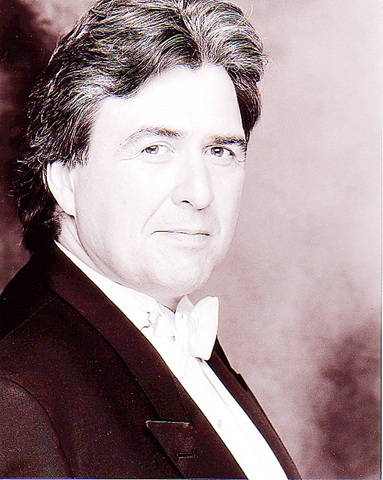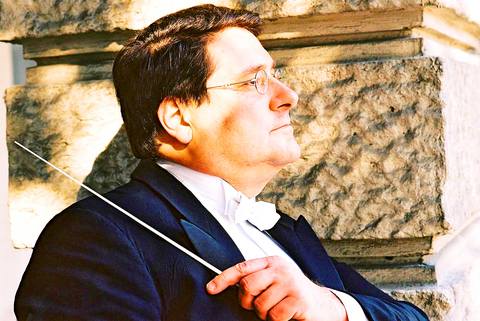In a surprise move on Tuesday, the management of Taiwan's National Symphony Orchestra (NSO) announced that they had not yet succeeded in appointing a new Music Director.
The current Music Director is Chien Wen-pin (簡文彬), and his seven-year contract expires on June 30.
The news followed two "audition concerts" in which the two supposed finalists in the race had conducted the orchestra in varied programs of music, including operatic excerpts, plus one virtuoso concerto item common to both evenings.

PHOTOS: COURTESY OF NSO
The most recent of these events was on Monday, and it was generally felt that the aspiring Music Director who led it, Austrian conductor Johannes Wildner, would be the successful candidate. But it was not to be.
"We will, for sure, invite Mr Wildner in the near future for more concerts," said a member of the management team, adding that the orchestra members had indicated their liking for him. The NSO instrumentalists were asked to mark a card Yes or No after each of the two audition concerts.
Chien is currently in Dusseldorf, where he spends a significant part of every year with Deutsche Oper am Rhein, one of Germany's most prestigious opera companies. He's due back in Taipei on Monday.

June 29 sees the Taipei premier of Richard Strauss' 1911 opera Der Rosenkavalier. This major event is the fruit of Chien's time with the German opera company. The entire production — scenery, costumes and all the soloists — is being flown in from Dusseldorf, but the orchestral accompaniment will be from the NSO, and Chien will conduct.
The production will be realistic and lavish, and the whole event a fitting conclusion to Chien's pioneering seven years at the NSO's helm, widely held to have been a success story.
In addition, Chien will lead the NSO on a short tour to Japan's Hokkaido next month, where they will play two venues.
Quite how matters will proceed after they return is anyone's guess. Concert schedules will have to be arranged, guest artists engaged, and visiting conductors sought. Some of this will already have been finalized, but with no guiding Music Director in charge, things can at best only proceed on a piecemeal basis.
The NSO will be anxious to avoid the experience of the Taipei Symphony Orchestra which, after the departure of Felix Chen Chui-sen (陳秋盛) towards the end of 2003, struggled on without a Music Director until the eventual appointment of Andras Ligeti over 12 months later. Some critics believe their years under Chen represented a peak of achievement that they have never subsequently managed to equal.
By contrast, the NSO has gone from strength to strength under Chien, becoming the nation's leading producer of opera, and presenting complete symphonic cycles of Beethoven, Mahler and Shostakovich and, most recently, a survey of the instrumental masterworks of Richard Strauss.
Chien's will be a hard act to follow. On the one hand it's understandable that the NSO management wants to come up with as high-profile an appointment as possible. But on the other, a long leaderless period can have unforeseen consequences. Future developments will be watched by the NSO's well-wishers with considerable interest, and not a small degree of concern.

From the last quarter of 2001, research shows that real housing prices nearly tripled (before a 2012 law to enforce housing price registration, researchers tracked a few large real estate firms to estimate housing price behavior). Incomes have not kept pace, though this has not yet led to defaults. Instead, an increasing chunk of household income goes to mortgage payments. This suggests that even if incomes grow, the mortgage squeeze will still make voters feel like their paychecks won’t stretch to cover expenses. The housing price rises in the last two decades are now driving higher rents. The rental market

July 21 to July 27 If the “Taiwan Independence Association” (TIA) incident had happened four years earlier, it probably wouldn’t have caused much of an uproar. But the arrest of four young suspected independence activists in the early hours of May 9, 1991, sparked outrage, with many denouncing it as a return to the White Terror — a time when anyone could be detained for suspected seditious activity. Not only had martial law been lifted in 1987, just days earlier on May 1, the government had abolished the Temporary Provisions Effective During the Period of National Mobilization for Suppression of the Communist

Hualien lawmaker Fu Kun-chi (傅?萁) is the prime target of the recall campaigns. They want to bring him and everything he represents crashing down. This is an existential test for Fu and a critical symbolic test for the campaigners. It is also a crucial test for both the Chinese Nationalist Party (KMT) and a personal one for party Chairman Eric Chu (朱立倫). Why is Fu such a lightning rod? LOCAL LORD At the dawn of the 2020s, Fu, running as an independent candidate, beat incumbent Democratic Progressive Party (DPP) lawmaker Hsiao Bi-khim (蕭美琴) and a KMT candidate to return to the legislature representing

Fifty-five years ago, a .25-caliber Beretta fired in the revolving door of New York’s Plaza Hotel set Taiwan on an unexpected path to democracy. As Chinese military incursions intensify today, a new documentary, When the Spring Rain Falls (春雨424), revisits that 1970 assassination attempt on then-vice premier Chiang Ching-kuo (蔣經國). Director Sylvia Feng (馮賢賢) raises the question Taiwan faces under existential threat: “How do we safeguard our fragile democracy and precious freedom?” ASSASSINATION After its retreat to Taiwan in 1949, the Chinese Nationalist Party (KMT) regime under Chiang Kai-shek (蔣介石) imposed a ruthless military rule, crushing democratic aspirations and kidnapping dissidents from